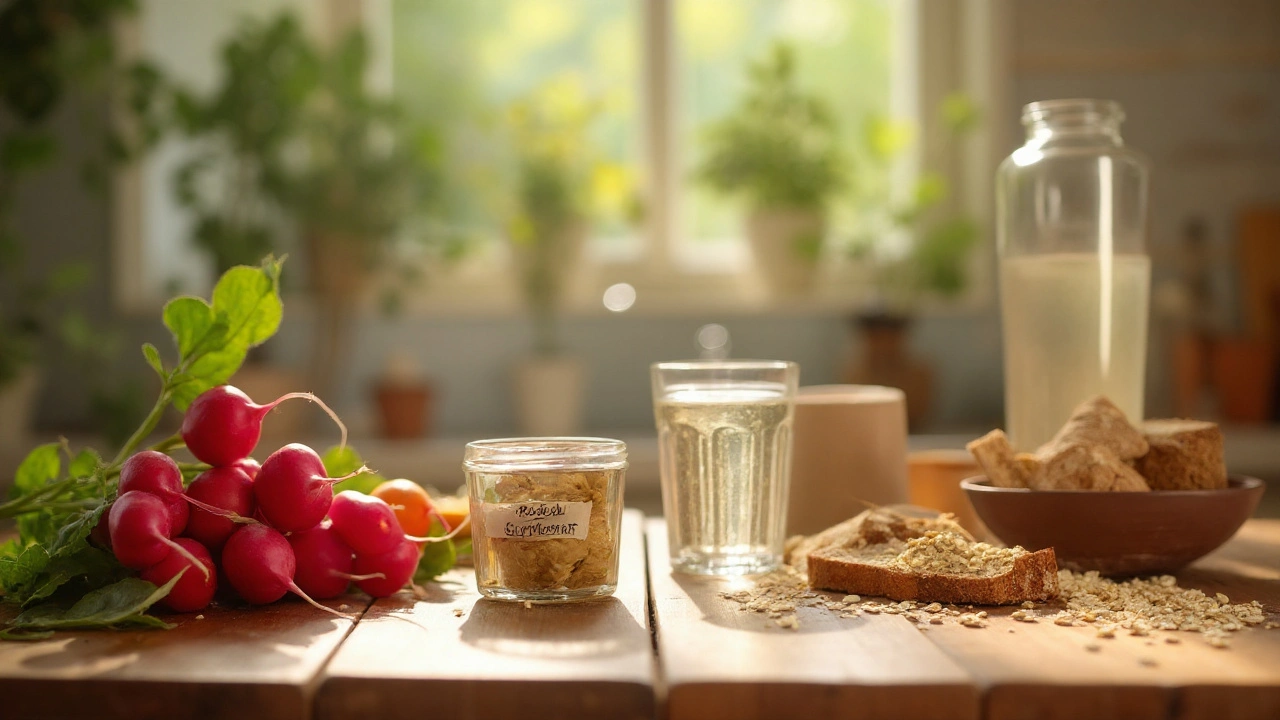Radish nutrition: calories, vitamins, fiber and quick benefits
Radishes are often treated like a crunchy salad garnish, but they bring real nutrition to the table. A typical raw red radish has about 16 calories per 100 g and supplies vitamin C, fiber, potassium and small amounts of a handful of other minerals. That low calorie count makes radishes a smart choice when you want volume without extra energy.
Nutrition facts (per 100 g raw)
Here are the common values you’ll see on food data lists: calories 16 kcal; protein 0.7 g; fat 0.1 g; carbohydrates 3.4 g; fiber 1.6 g; sugars 1.9 g. Key micronutrients include vitamin C ~14.8 mg, folate ~25 µg, potassium ~233 mg, calcium ~25 mg, magnesium ~10 mg, and iron ~0.3 mg. Radish leaves contain more vitamin A and vitamin C than the root, so don’t throw them away if you can use them.
That fiber content is modest but useful: 1–2 g per 100 g helps add bulk and slow digestion a bit, which can help with appetite control. The carb and sugar counts are low enough that radishes have minimal impact on blood sugar when eaten in normal portions.
Health benefits and smart uses
Radishes are part of the brassica family and contain compounds like glucosinolates and various antioxidants. These compounds support general cell health and add a peppery flavor. Vitamin C supports the immune system and collagen production, while potassium helps with fluid balance and supports healthy blood pressure when combined with a balanced diet.
How to eat them: raw slices in salads, thinly sliced on tacos, roasted with a little olive oil and salt, or quick-pickled for a tangy crunch. Daikon (the long white radish) is milder and great in soups, kimchi or grated into slaws. Radish greens are edible—sauté them like spinach, blend into pesto, or toss raw into salads for extra vitamins and a peppery kick.
Storage tips: remove the greens if you won’t eat them right away; store the roots in a sealed bag in the fridge and they’ll keep for 1–2 weeks. Greens should be used within a few days—wash and dry them, then wrap loosely in paper towel and refrigerate.
One quick caution: radishes and other cruciferous vegetables contain goitrogenic compounds that can affect thyroid function in very large amounts, especially if you have an existing iodine deficiency. For most people, normal food amounts are fine. If you have thyroid disease, ask your clinician about your diet.
Want simple recipe ideas? Try sliced radish with butter and salt on toast, roasted radishes with garlic and thyme, or a quick daikon-carrot pickle to brighten meals. Small changes like these add texture, crunch and nutrition without extra calories.
Radish Supplement Benefits: How Radish Can Transform Your Health
Discover how a radish supplement can help boost your health, improve digestion, and offer natural support, plus tips to add it to your daily routine.
